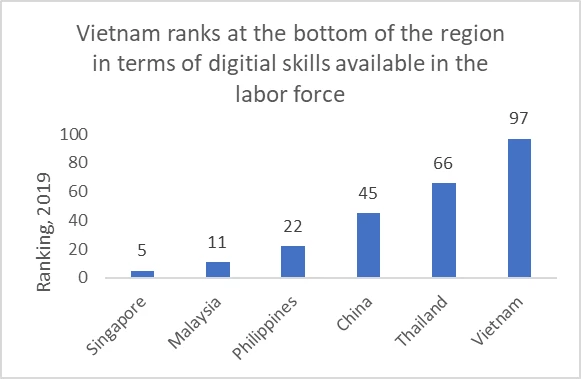 The dividends associated with the rapid digitalization of the Vietnamese economy are highly dependent on whether the labor market can adapt. Photo: xtock/Shutterstock
The dividends associated with the rapid digitalization of the Vietnamese economy are highly dependent on whether the labor market can adapt. Photo: xtock/Shutterstock
Paris, 2045. A French university lecturer is explaining how Vietnam, once a poor country, has grown to become one of the world’s digital powerhouses. To his wide-eyed students, he explains how the country opened itself to global technologies in the 2020s. He describes how Vietnam leveraged its geographical location, modernized its communications infrastructure, and adjusted its institutional and legal frameworks to shape this evolution. Perhaps the most startling success, he tells his students, is how the country was able to transform its labor force to become one of the most digitally skilled in Asia.
This vision of the future is the one anticipated by the latest national development strategy adopted by Vietnam’s Party Congress in February 2021. The digital sector is viewed as one of the country’s engines of growth over the next decades, enabling Vietnam to achieve its ambition of becoming a high-income economy by 2045. Such a transformation will not be a small undertaking. As with other technological revolutions in the past, such as electricity, the digitalization of the economy will have tremendous implications for individual lives and society as a whole. These changes are already visible in front of our eyes but are expected to become even consequential in the future.
The World Bank has started to analyze what all these changes will mean for Vietnam. Our economic modeling shows that the rapid digital transformation envisioned by the Government could indeed help the country achieve its ambitious goals. If digital sectors expand by about 10 percent every year, the cumulated monetary gains for the economy will exceed US$200 billion over 2021-45, or about the size of the country’s current GDP. Not only will the digital sectors become a more important part of the economy, but the use of computers, information technology tools, and digital platforms will create productivity gains for the rest of the economy. These gains would exceed the investment costs required to achieve this rapid expansion, which are estimated in the range of US$35 billion over the next two decades.
However, the dividends associated with the rapid digitalization of the Vietnamese economy are highly dependent on whether the labor market can adapt . The digitalization process will both destroy and create jobs. Jobs will disappear as new digital technologies replace labor, while expected complementarities between digital capital and skilled labor will give rise to new jobs, including expanded opportunities for work made possible by evolving information and communications technology, such as on social networks, e-commerce platforms, and in analytics using data gathered from the web.
In theory, the digitalization process will create seven times more jobs than jobs it destroys. By 2045, an estimated 10 million net new jobs would have been created , mainly in modern services (finance, communication, tourism) and to a less extent in manufacturing. However, in reality, the creation of new jobs may be constrained by the lack of skills in the domestic labor force. For example, workers will need to acquire the right skills to maximize the time saved or manage the information collected through digital platforms. In contrast, the job losses are likely to be immediate.
Unfortunately, Vietnam is seriously lagging its main competitors in the region in terms of available digital skills today (see Figure). If we assume that Vietnam’s pool of skilled workers will fall short of what is required by a rapid digital transformation, the economy could lose as many as two million jobs by 2045. Therefore the digital transformation will lead to the replacement of labor by digital capital, reducing overall gains for the economy, and creating significant inequalities that could in turn generate economic and social tensions.
Source: World Economic Forum Competitiveness Report, 2019.
The main takeaway of this exercise is that the success of digital transformation of the Vietnamese economy will require upgrading the digital skills of its local labor force. Otherwise, Vietnam will gain little (or not as much as expected) from this process, as many Vietnamese won’t be able to find a job.
Upgrading the skills of the workforce is by no means is impossible for Vietnam. One could expect the domestic labor market to adjust gradually over time as the excess demand for skilled labor leads to higher relative wages that will in turn incentivize workers and firms to further invest in education and training. However, such market-driven adjustment will take time, as demonstrated by international experience. Workers may not have the information or the financial resources to invest in longer education paths, while firms may be reluctant to train workers who could take their new skills to competitors.
To upgrade the country’s labor force and respond to the higher demand for skilled labor by businesses, the government will have to act boldly, preferably in close coordination with the private sector . Further flexibility will be needed so that workers can move easily from one sector to another by removing many existing legal obstacles to labor mobility. The authorities can help provide information to workers on labor market trends and demands to inform their decision-making. The development of skills will also require improving the quality of technical/vocational education programs, facilitating the entry or the return of talented workers, and supporting firms and workers financially in their efforts to acquire new sets of skills. If many countries around the world have adopted one or several measures to support these actions, the most successful ones, like Singapore or the Republic of Korea, have implemented all of them simultaneously. This is what we recommend Vietnam should do with a sense of urgency in our August Taking Stock report, Digital Vietnam – The Path to Tomorrow.



Join the Conversation